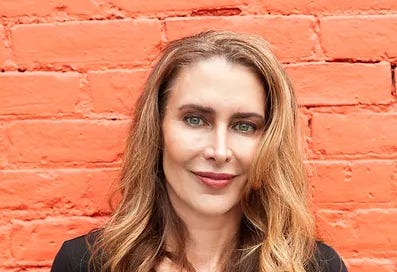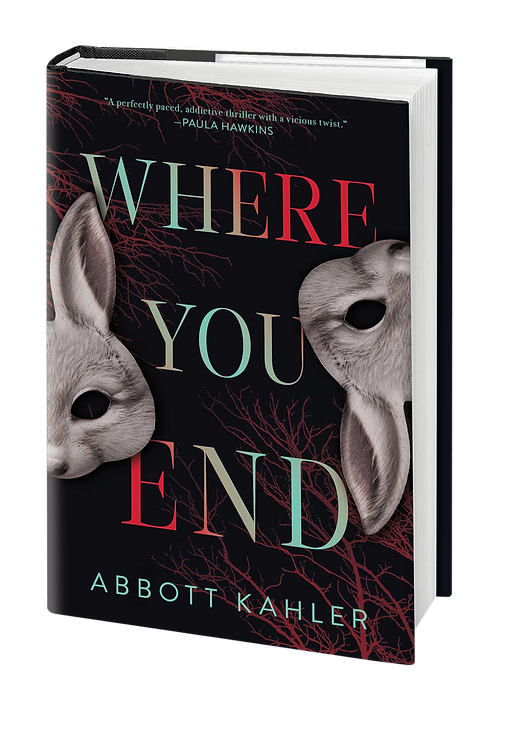Interrogation: Abbott Kahler
A Blood & Whiskey interview with the author of WHERE YOU END. Plus a book-themed cocktail, The White Rabbit.
Hello friends and readers,
Happy New Year — and, for those partaking, happy Dry January. A full Blood & Whiskey newsletter is coming next week, with cocktails and mocktails. But first, I’m happy to share this Q&A with the hyper talented Abbott Kahler, whose previous books (written as Karen Abbott) include Sin in the Second City; American Rose; Liar, Temptress, Soldier, Spy; The Ghosts of Eden Park.
Now Abbott has done what many of us nonfiction writers dream of: written a novel, and a very good one… Where You End, out next week, is the story of twins Kate and Jude in the days after an accident has wiped out Kat’s memory. Slipping back and forth in time (before and after the accident) we slowly learn who these sisters really are, that their childhood wasn’t as idyllic as Jude tells Kat it was, and why they’re still haunted by their time in “The Plan” (the details of which I won’t spoil here). It’s creepy, twisty and intense. It’s already earned a starred review from Publisher’s Weekly (“brilliant and spine-tingling”) and Kirkus called it “a vertiginous paranoia tale and a melancholic meditation on identity.”
I reached out to Abbott with a six pack of questions.
What was the biggest challenge pivoting from researched nonfiction to making shit up?
I found myself comparing the two genres while writing WHERE YOU END. You can’t write bad dialogue in nonfiction. All of the conversations are already written out for you, immutable and perfect in the historical record. You’ll never make a wrong decision with your plot, because you’re merely recording the twists and turns rather than inventing them. My nonfiction outlines, which are always inevitably longer than the books themselves, offer a clear blueprint of the narrative trajectory. But dead people are stubborn. They don’t always do what you want them to do, or say what you want them to say, or make decisions that generate interesting plot paths. Chronology can also be an issue, since dates and world events are annoyingly immovable.
Fiction, on the other hand, is thrillingly liberating but also terrifying; there are so many possible narrative pitfalls and dead ends. When I wrote an outline for WHERE YOU END, my characters wanted to rebel against it, and I had to listen to them.
What was the best part? No endnotes or bibliography?
That was definitely a highlight! Although I should say that I did have to do a bit of research for WHERE YOU END, particularly the appearance and vibe of Philadelphia in the 1970s and 1980s (I visited my cousins in the city frequently, but lived in Norristown, just outside the city limits).
Like a lot of big cities during those decades, Philly had a bit of a Wild West feeling, and I wanted that to come across as accurately as possible.
How did the twins in Where You End come to you? How did you research the lives of twins?
WHERE YOU END is actually inspired by a strange, true story of identical twins and amnesia. In 2019 I watched a fascinating documentary called Tell Me Who I Am, which tells the story of British identical twins Marcus and Alex Lewis. Alex suffered a traumatic brain injury, and when he awakened from his coma he recognized only his twin’s face and name. All other memories and history had vanished. In this tragedy, Marcus found an opportunity: he would rewrite their history and invent new memories—ones that bore little resemblance to reality.
I was also inspired by my mother and her identical twin. Like the twins in the book, they’re named Katherine and Judith and are mirror twins—a phenomenon that occurs when the embryo splits later than usual. My mom is right-handed and my aunt a lefty; their hair parts naturally on opposite sides. Looking at each other was akin to looking in a mirror. Even the secret language Kat and Jude use in the book was based on a language my mom and her twin had invented when they were young. I had been observing this unique twin bond all of my life, and the complicated relationship between Kat and Jude came naturally to me.
In your nonfiction and now in fiction, you keep things dark. I'm curious: if you had to, where would you hide a body?
This is an excellent question, and one I’ve thought about over the years (in terms of plotting novels, of course)! My runner-up option would be the meat grinder route: run the body through the machine and either toss the bits or use them as fertilizer. But this method necessitates a very messy preliminary task: severing limbs and other body parts to avoid cogging up the wheels, so to speak. I think the better option would be an iron barrel and a generous dose of concentrated lye. Let the body simmer in there for a month until it’s reduced to sludge, and then either bury the barrel or toss the sludge down the gutter.
Come to think of it, there’s one more option: dispose of the body on the Galapagos island of Floreana. My next nonfiction book, THEN CAME THE DEVIL, features a few mysterious disappearances—and bodies that were never found.
[ed. note: Then Came the Devil: A True Story of Sex, Murder, and Utopia at the Dawn of World War II is coming in 2025. Read a short sample HERE]
"The Plan" was creepy as shit (and reminded me a little bit of this weird weekend retreat thing my Catholic school did our senior year, called "Search"). Was "The Plan" based on any true story, or totally from the mind of Abbott?
I did a bit of research into Werner Erhard and his “Erhard Training Seminars” (later known as the Forum). All sorts of self-improvement movements were born in the 1970s and EST was among the most popular, attracting various celebrities (some of whom are mentioned in WHERE YOU END). The basic idea was that you could change your life by “experiencing” your negative habits and thought patterns and choosing to reframe them. But the rest of The Plan, including the animal games, is all my own invention. Weirdly, Erhard is from my hometown.
What book or writer who made you want to become a writer - and why?
I’ve loved Edgar Allan Poe as soon as I could understand him. When I was a kid, I would often try to rewrite his stories from another character’s point of view. For instance, what was Madeline Usher thinking when she was trapped behind those bricks? What story would she have told? He helped me identify my favorite feeling: a sense of dread. There is no other feeling I enjoy more while reading a book. (In real life, of course, I prefer no dread at all.)
What's your go-to cocktail - and where?
Oh, I love this question! My current favorite cocktail (usually at home) is the White Rabbit, in honor of WHERE YOU END.
The White Rabbit
8 oz vodka
4 oz triple sec
4 oz fresh lemon juice
A splash of simple syrup
Mint leaves
Delicious and deceptively potent...
“dead people are stubborn”
And here’s a couple from the archives…
I interviewed Abbott at Book Expo in 2014:
… and at Elliott Bay Books in 2011:
“Let the body simmer in there for a month until it’s reduced to sludge, and then either bury the barrel or toss the sludge down the gutter.”
Thanks for reading. More “Interrogation” interviews: here.
Feel free to like or comment below. And if you know others who might enjoy Blood & Whiskey (or need intel on disposing a body), please share:
Till next week…
-Neal
Find me @ Instagram; sometimes Facebook, Twitter, LinkedIn, Goodreads





